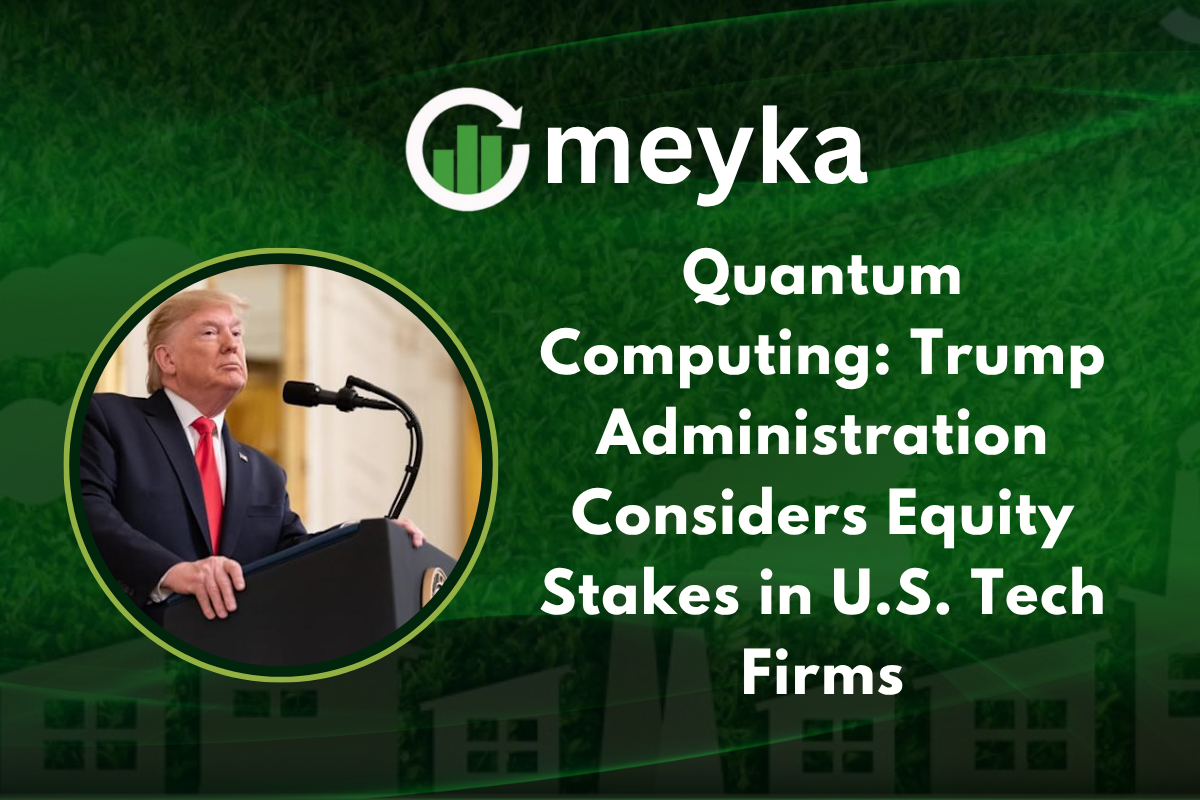Quantum Computing: Trump Administration Considers Equity Stakes in U.S. Tech Firms
The Trump Administration is in talks to take equity stakes in U.S. Quantum Computing companies. Officials have held early discussions about minority investments in firms such as IONQ and Rigetti, according to reporting by the Wall Street Journal and Reuters.
The move signals a new, assertive role for federal policy in securing key technologies. Why now, and what might this mean for industry and national security?
Why Is the U.S. Government Focusing on Quantum Computing?
Quantum Computing is the next wave of computing power. It promises to solve complex problems far faster than classical machines. The technology has uses in cryptography, drug discovery, materials science, defense simulations, and AI research. U.S. officials call it a critical strategic technology that could shape economic and military leadership for decades.
Reuters reported that Washington officials see direct stakes as a tool to protect and accelerate domestic progress in Quantum Computing.
Why is this happening now? Because global rivals are moving fast. The U.S. fears falling behind as China and others pour money into quantum research. The policy push aims to preserve technology independence and ensure core capabilities stay onshore.
Inside the Trump Administration’s Quantum Investment Talks
According to The Wall Street Journal, talks center on minority ownership stakes in private and public firms that build quantum processors and software. The Dow Jones briefing and Morningstar coverage say the plan is part of a broader national security push to de-risk supply chains and secure critical technologies.
Potential targets include IONQ, Rigetti Computing, and other startups in the U.S. quantum ecosystem. Officials emphasize influence, not control, through minority positions.
What are the goals? Government stakes would aim to stabilize funding, guide R&D priorities toward national needs, and shield crucial know-how from foreign exposure.
The Strategic Reason Behind the Move
Equity participation gives the government tools other than grants or contracts. A minority share offers visibility into corporate plans and a seat at the table for strategic decisions.
The Wall Street Journal frames this as a way to steer commercial activity that has national security value, while letting companies retain private governance. The idea is to strike a balance: protect strategic assets, but avoid nationalization.
What does this mean for investors? Reports suggest the prospect of federal funds can lower financing risk. That could draw new institutional capital into Quantum Computing companies and related AI and hardware firms. Investors often view government backing as a stabilizer in high-capex sectors.
Impact on Firms Like IONQ and Rigetti
After the initial reporting, shares of public quantum players responded to the news. Market coverage noted price moves in IONQ (IONQ) and other listed names, as investors priced in the chance of new federal support.
Both IONQ and Rigetti focus on different hardware platforms, trapped-ion versus superconducting qubits, but both need long-term capital to scale. Government stakes could fund chip upgrades, error-correction research, and factory-scale quantum cloud services.
Could public investment slow innovation? Experts cited in coverage caution that oversight can introduce friction. Yet most observers say the immediate effect would likely be more reliable funding and a longer runway for risky R&D efforts.
Global Reactions and Geopolitical Context
This proposal comes amid an intensifying U.S.-China tech rivalry. China has accelerated public funding for quantum research, satellite encryption, and cryptographic capabilities. Europe is also boosting its Quantum Flagship programs. U.S. equity stakes would be a strategic countermeasure to keep critical advances in Quantum Computing tied to American firms and standards.
Morningstar and Dow Jones reports highlight the geopolitical logic: quantum tech affects encryption, defense, and commercial AI competitiveness.
Why does geopolitical context matter? Quantum breakthroughs could undermine existing encryption standards. That ties the technology directly to national security and international power balances.
What Analysts Are Saying About Federal Stakes
Analysts in WSJ and Morningstar comment that federal participation could reshape public-private partnerships. The idea may spur venture capital interest, and institutional investors might see reduced downside.
Analysts also note the need for strong governance rules to avoid conflicts of interest. If done carefully, minority stakes could attract more private funding into the sector and accelerate commercial milestones in Quantum Computing.
Will the government control these firms? No, reporting stresses that minority stakes are being considered. That means influence without takeover, preserving private entrepreneurship while securing public interest.
Broader Economic and Market Implications
Policy-driven investment in Quantum Computing could lift related sectors. Expect spillover effects in AI innovation, high-performance computing, semiconductor supply chains, and cloud quantum services.
Investors are watching how federal commitments might change valuations and risk profiles across emerging tech markets.
Coverage from Investors.com suggests that policy action could create a new growth frontier for Wall Street, with long-term implications for industrial strategy and national competitiveness.
Challenges and Concerns Ahead
Several risks remain. Lawmakers could question the wisdom and legality of direct equity stakes. Transparency and conflict-of-interest safeguards will be essential. Execution is complex: selecting firms, valuation terms, and exit plans all matter.
There is also a reputational and diplomatic cost; allies or partners may view direct investments as protectionist. Finally, commercial quantum technology is still maturing; meaningful, scalable applications may be years away despite fast progress.
These caveats appear in analyst notes and reporting across the WSJ and Reuters pieces.
Is this a cure-all? No. Government stakes can help, but they cannot replace strong private capital, skilled talent, and open research ecosystems.
Conclusion: Quantum Computing at the Center of U.S. Tech Strategy
The talks on federal equity stakes mark a new chapter in how the U.S. may defend and foster critical tech. Quantum Computing moves from lab curiosity to central policy concern. If the plan goes forward, it will blend national security aims with industrial policy, aiming to secure technology leadership while supporting long-term innovation.
For investors and tech leaders, the proposal changes the calculus: public partners could become stable backers in a capital-hungry field. As Reuters and the Wall Street Journal report, this step reflects the urgency in Washington to keep America competitive in the quantum era.
FAQ’S
Nvidia’s venture capital arm has invested in PsiQuantum, a quantum computing startup valued at $7 billion, as part of its move into the quantum sector.
Yes, the U.S. government is investing in quantum technologies through initiatives like the National Quantum Initiative and direct funding such as the Department of Energy’s $65 million quantum computing awards, signs of broad federal support for the field.
Disclaimer
The content shared by Meyka AI PTY LTD is solely for research and informational purposes. Meyka is not a financial advisory service, and the information provided should not be considered investment or trading advice.






